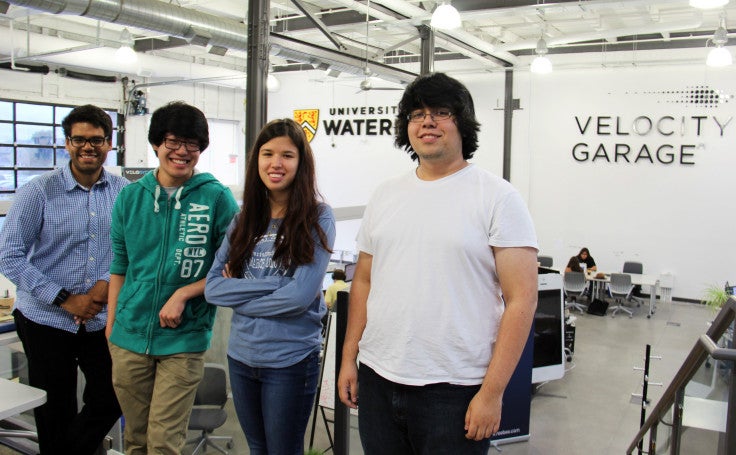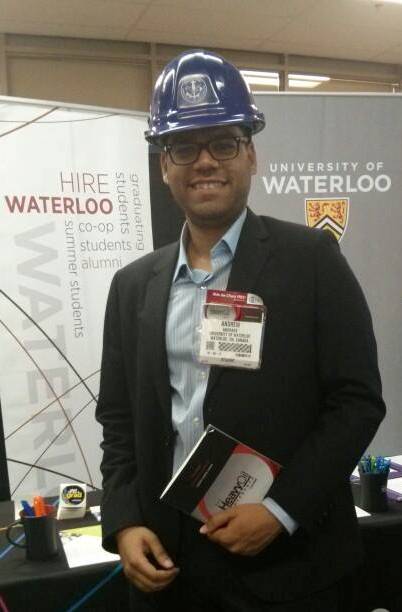When I started my Enterprise Co-op (E Co-op) term in May, Dominic Toselli and I were just a team of two co-founders looking to use technologies that we used at companies in Silicon Valley to optimize decision making in the oil and gas industry. Since then, we've added 4 others and effectively tripled the PetroPredict team. Over the past couple of months we were able to run a high performance team and enable our company to grow and scale.

Above: Dominic Toselli (left) and Andrew Andrade, co-founders of PetroPredict.
New skillset as a leader
Leading and building a high performance team was new to me, but as with any new skill, with effort, it is possible to learn. Through high school co-op, summer jobs, and university co-op, I had great opportunities to work in different corporate environments with many different leaders and mentors. Getting advice and learning from the past are some of the best ways to optimize performance in the future.
Scaling knowledge
One of the most important things - if not the most important thing - that a startup can have, is the ability to grow and scale. It is obvious that companies can scale in technology, customers and sales, but almost every aspect of a startup has to scale, including things like company culture.
One aspect that I wanted to elaborate on is scaling knowledge. Working at a startup means that taking on many roles and having a diverse number of skills. Even if you take an iterative approach, where you learn a little and then do a little, it can be difficult to acquire knowledge at the speed needed for the startup.
A great solution to this is by the use of massive open online courses (MOOCs). We are lucky to live in a time where there is free access to very useful courses. Specifically, I found that Udacity was one of the very best ways to allow team members to gain knowledge. For example, when our high school summer student Kevin Peng joined the team, he had never used Git software or version control before. Instead of reading boring documentation to learn Git, he made his own version of the game 2048 in a couple hours through Udacity’s course.

Above, from left to right: PetroPredict team members Andrew Andrade, Kevin Peng, Ksenia Merkoukhina and Jonathan Estrella at the Velocity Garage.
Read Kevin's blog about working with PetroPredict.
Eat your own dog food
A great philosophy I learned on a co-op term at Facebook is to "eat your own dog food," or use your own product to validate its quality and capabilities. This idea can also be applied to being a leader. Leaders set an example for others, so throughout the term, I used Udacity to scale my own knowledge.
Run lean, mean and agile
Running lean and agile and is fundamental to running high performance teams. The biggest idea behind these techniques is to understand what is the most important and valuable thing that can be done and executing as quickly as possible. Here are some tools I find useful:
Beginning of term goal-setting – Get team members to set goals at the beginning of the term, and help motivate them to achieve their goals.
Weekly reports – At the end of the week, do a quick summary of what was worked on during that week and set goals for the next week.
Weekly meetings – At the beginning of the week, summarize what went on last week and the high level goals for this week. These are also great opportunities to talk about company news.
Daily goals – Daily scrum meetings or "stand ups" can be used effectively for low level goal-setting. This also provides an opportunity for team members to talk about issues or roadblocks they are facing and provides opportunities for collaboration.
Asana – Asana is a great product management and collaboration tool. It works great for us, as our team works remotely.
Company wiki – Setting up and running a central source of knowledge for the company enables opportunities for quick collaboration and knowledge capture.
Udacity – As I mentioned, Udacity really helps with scaling knowledge. Every lesson is a short video (usually less than 5 minutes) and has quick quizzes and application-based assignments, so you can quickly brush up on specific topics from courses related to How to Build a Startup, data science, web development, machine learning, and more.
About Andrew

Andrew Andrade is a Mechatronics Engineering and Enterprise Co-op student with strong passions for artificial intelligence, robotics and man-machine symbiosis.
Andrew is a co-founder of PetroPredict and envisions a world where information technology allows humans and computers to make better decisions control complex situations without relying on pre-programmed solutions. When he is not building technology, Andrew is traveling the world and climbing mountains.
About PetroPredict
PetroPredict is a prediction engine for the oil and gas industry that enables engineers to identify low capital and high reward optimization opportunities for their assets. PetroPredict's vision is to revolutionize the way the energy industry makes decisions to improve their profitability and efficiency. Our mission is to apply quantitative engineering, distributed computing techniques, and geospatial analysis to allow the petroleum industry to make smart enterprise decisions.
